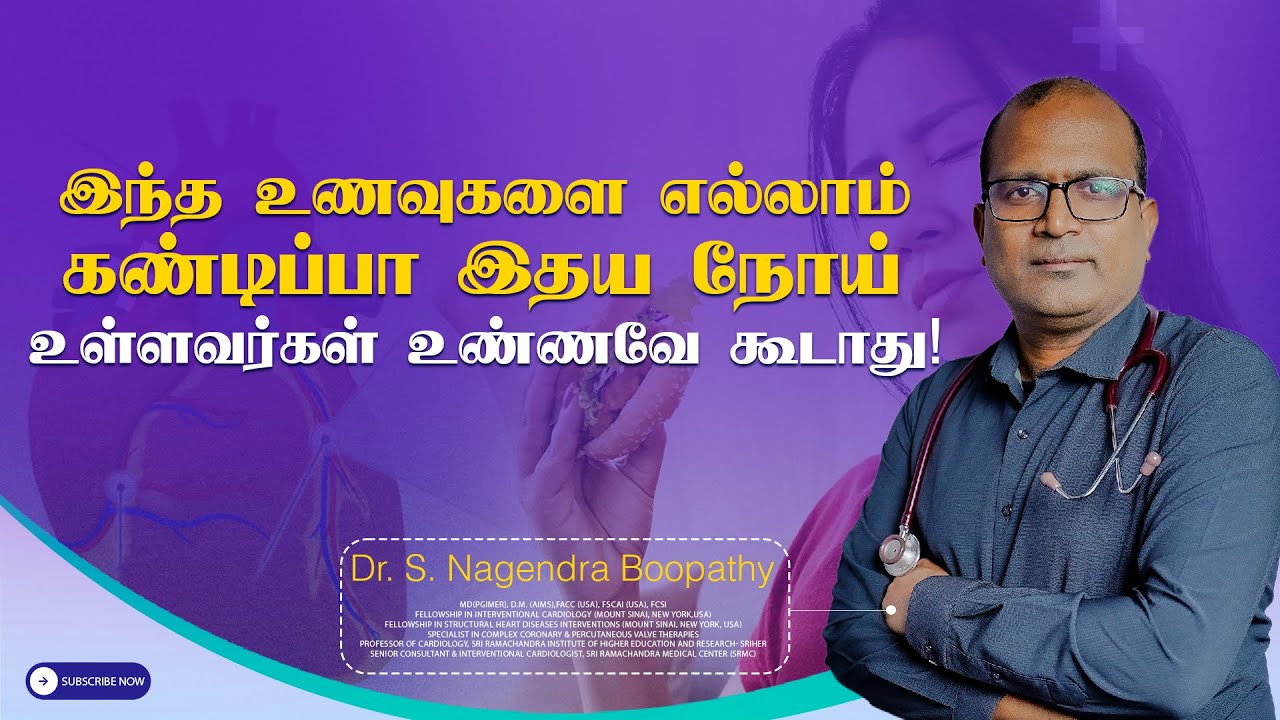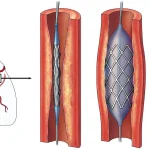Heart health is a crucial aspect of overall well-being, especially for those who have experienced heart conditions such as heart attacks, angioplasty, stenting, or bypass surgery. Diet plays a pivotal role in managing cardiovascular health, and making the right food choices can significantly impact recovery and prevention of further complications. Dr. Nagendra Boopathy, a renowned cardiologist and professor at Sri Ramachandra Medical Center, shares his expert insights on the foods that heart patients should avoid to maintain a healthy heart and enhance their quality of life.
In this comprehensive guide, we will explore the key foods to steer clear of, the rationale behind these recommendations, and healthier alternatives that support heart health. Whether you are a heart patient or someone looking to improve your cardiovascular wellness, understanding these dietary guidelines can empower you to make better choices for a stronger, healthier heart.
Why Diet Matters for Heart Patients
“Food is medicine,” as Dr. Boopathy emphasizes, echoing the wisdom of our ancestors. The food we consume directly influences our body’s health, including the heart. For heart patients, certain foods can exacerbate conditions by increasing cholesterol levels, blood pressure, and inflammation, while others can support healing and reduce cardiac risks.
After a cardiac event or procedure, patients often have many questions about what they should eat. The confusion is understandable given the abundance of conflicting dietary advice available. However, Dr. Boopathy’s guidance is rooted in years of clinical experience and research, focusing on eliminating foods that harm the heart and encouraging those that promote recovery.
Top Foods Heart Patients Should Avoid
Heart patients need to be particularly cautious about certain categories of food that contribute to heart disease progression. Below is a detailed look at these foods and why they should be avoided:
1. Red Meat and Processed Meats
Red meat, including beef, lamb, and pork, contains high levels of saturated fats and cholesterol, which can clog arteries and raise blood cholesterol levels. Surprisingly, many people are unaware that pork also has a significant amount of bad cholesterol (saturated fats). Processed meats such as bacon, hot dogs, and sausages are even more harmful due to their high salt content and preservatives.
Dr. Boopathy advises heart patients to avoid red meat and processed meats altogether or limit their intake to occasional consumption, not more than once a month. Importantly, fried preparations of these meats should be strictly avoided due to the added unhealthy fats.
2. Fried Foods
Fried foods are a major source of trans fats and saturated fats, both of which are detrimental to heart health. Trans fats, in particular, are harmful because they not only raise bad cholesterol (LDL) but also lower good cholesterol (HDL). Additionally, repeatedly used cooking oils for frying accumulate toxic trans fatty acids.
Examples include French fries, fried snacks, fried chicken with skin, and deep-fried Indian snacks. Dr. Boopathy recommends avoiding these entirely and opting for healthier cooking methods such as baking, grilling, or steaming.
3. Refined Grains and Polished Rice
Refined grains, including polished white rice and refined wheat products, lack essential nutrients and fiber. They have a high glycemic index, which causes rapid spikes in blood sugar and insulin levels, contributing to diabetes and heart disease.
Switching to whole grains like brown rice, whole wheat, millets, and other unpolished grains is beneficial. Whole grains provide fiber that helps control cholesterol and maintain blood sugar levels.
4. High Salt (Sodium) Foods
Excess salt intake is strongly linked with high blood pressure (hypertension), a major risk factor for heart disease and stroke. Processed foods, packaged snacks, biscuits, and many Indian sweets often contain hidden salt.
Dr. Boopathy stresses the importance of reducing salt intake and avoiding salty snacks like biscuits and processed fast foods. Opting for fresh, home-cooked meals with minimal salt is advisable.
5. Full-Fat Dairy Products
Full-fat milk, butter, cream, and cheese are rich in saturated fats, which can elevate cholesterol levels. Many commercial milk brands offer toned or low-fat options that are better suited for heart patients.
Heart patients should avoid full-fat dairy and switch to low-fat or skimmed milk products. Avoid milk-based chocolates and sweets that are rich in saturated fats and sugars.
6. Sugary Foods and Drinks
Sugar-laden foods such as cakes, ice creams, pastries, and Indian sweets contribute to weight gain, insulin resistance, and inflammation. Even fruit juices with added sugar can be harmful due to their high calorie content.
Dr. Boopathy advises minimizing sugar intake and avoiding sugary beverages. If you consume fruit juices, choose fresh, unsweetened varieties and limit the quantity.
7. Alcohol
Alcohol consumption should be reduced or avoided, especially in heart patients. Excessive alcohol intake can raise blood pressure, contribute to arrhythmias, and add empty calories leading to weight gain.
If alcohol is consumed, moderation is key, and it is best to consult your cardiologist for personalized advice.
8. Junk Foods and Fast Foods
Fast foods such as pizzas, burgers, hot dogs, and packaged snacks are usually high in trans fats, saturated fats, salt, and refined carbohydrates. These foods are linked to obesity, diabetes, and heart disease.
Dr. Boopathy recommends avoiding junk food completely to protect heart health.
Healthy Alternatives and Recommendations for Heart Patients
While avoiding harmful foods is essential, it is equally important to include heart-healthy foods that provide adequate nutrition, especially protein, fiber, vitamins, and good fats.
Protein Sources
Protein is vital for repairing tissues and maintaining muscle mass. Heart patients should aim for approximately 1 gram of protein per kilogram of body weight daily. But the source of protein matters:
- White Meat: Skinless chicken and turkey are excellent sources of lean protein with less saturated fat.
- Fish: Fatty fish like salmon are rich in omega-3 fatty acids, which have heart-protective properties.
- Plant-Based Proteins: Legumes, lentils, beans, tofu, and other plant-based proteins are not only heart-friendly but also rich in fiber and antioxidants.
- Occasional Red Meat: If desired, red meat can be consumed rarely (e.g., once a month) and should never be fried.
Cooking Methods
Healthy cooking methods help preserve nutrients and reduce unhealthy fat intake:
- Baking: Baking foods like potatoes instead of frying reduces fat content.
- Grilling: Grilling chicken or fish without skin is a great way to enjoy flavorful meals with less fat.
- Steaming and Boiling: These methods are ideal for vegetables and grains.
For example, if you love potatoes, try baking or grilling them instead of deep-frying. This simple change can make a significant difference in your heart health.
Whole Grains Over Refined Grains
Replacing white rice and refined wheat products with whole grains like brown rice, millets, barley, and whole wheat bread helps control blood sugar and cholesterol levels. Whole grains have more fiber and essential nutrients that support cardiovascular health.
Reducing Salt Intake
Use herbs, spices, lemon juice, and vinegar to flavor your food instead of salt. Avoid packaged snacks and biscuits that contain hidden salts. Preparing fresh meals at home is the best way to control sodium consumption.
Fruit and Vegetables
Eating a variety of fresh fruits and vegetables provides antioxidants, vitamins, and minerals that help reduce inflammation and protect the heart. Aim for at least five servings daily. Fresh juices should be consumed without added sugar and in moderation.
Limit or Avoid Alcohol
If you drink alcohol, do so in moderation and preferably avoid it altogether if you have heart conditions. Consult your healthcare provider for personalized advice.
Regular Physical Activity
Maintaining an active lifestyle complements a heart-healthy diet. Even moderate exercise like brisk walking or treadmill walking for 25 minutes at 6 km/h can help burn calories and improve cardiovascular fitness. The balance between calorie intake and expenditure is vital for weight management and heart health.
Common Questions About Diet for Heart Patients
Q1: Can heart patients eat chicken and fish?
Yes, heart patients can and should include lean protein sources like skinless chicken and fish, especially fatty fish like salmon, which contains omega-3 fatty acids beneficial for the heart. Avoid fried preparations and prefer grilled or baked options.
Q2: Is it okay to eat red meat occasionally?
Red meat should be limited to rare occasions, such as once a month, and should never be fried. Opt for lean cuts and smaller portions to minimize saturated fat intake.
Q3: What are the best cooking methods for heart patients?
Healthy cooking methods include baking, grilling, steaming, and boiling. These methods reduce unhealthy fat intake compared to deep frying or pan-frying.
Q4: Why should heart patients avoid refined grains and polished rice?
Refined grains lack fiber and essential nutrients and have a high glycemic index, causing rapid blood sugar spikes. This can worsen diabetes and heart disease. Whole grains are a healthier alternative.
Q5: How important is salt reduction for heart patients?
Reducing salt intake is critical to controlling blood pressure and reducing the risk of heart disease. Avoid processed foods and snacks high in sodium, and use natural herbs and spices for flavoring.
Q6: Can heart patients consume dairy products?
Full-fat dairy products should be avoided. Instead, choose low-fat or toned milk and dairy products to reduce saturated fat intake.
Q7: Are sugary foods and drinks harmful?
Yes, sugary foods and drinks contribute to weight gain, insulin resistance, and inflammation, all of which negatively impact heart health. Limit sugar intake and avoid processed sweets and sugary beverages.
Q8: Is moderate alcohol consumption safe for heart patients?
Alcohol should be minimized or avoided. If consumed, it should be in moderation and only after consulting with a healthcare provider.
Summary: Key Takeaways for Heart-Healthy Eating
- Avoid red meat and processed meats; limit red meat to rare occasions.
- Eliminate fried and deep-fried foods from your diet; choose baking, grilling, or steaming.
- Switch from refined grains and polished rice to whole grains and unpolished cereals.
- Reduce salt intake by avoiding processed snacks and using natural seasonings.
- Choose low-fat or toned dairy products instead of full-fat variants.
- Limit sugar consumption; avoid sugary snacks, sweets, and sweetened beverages.
- Consume lean protein from skinless poultry, fish, and plant-based sources.
- Minimize or avoid alcohol consumption.
- Eat plenty of fresh fruits and vegetables daily.
- Engage in regular physical activity to balance calorie intake and output.
Final Thoughts
The journey to heart health is a lifelong commitment to mindful eating and a healthy lifestyle. Dr. Nagendra Boopathy’s expert advice underscores the critical role of diet in managing and preventing heart disease. By avoiding harmful foods such as red meat, fried items, refined grains, high-salt foods, full-fat dairy, sugary treats, and junk food, heart patients can significantly improve their cardiovascular outcomes.
Embracing a diet rich in lean proteins, whole grains, fresh fruits, and vegetables, combined with regular exercise, can help rebuild heart strength and reduce the risk of future cardiac events. Remember, food is not just fuel—it is medicine. Making informed dietary choices is one of the most powerful tools you have to protect your heart and live a vibrant, healthy life.
Take charge of your heart health today by making these simple but effective changes in your diet and lifestyle. Your heart will thank you!
Dr. S Nagendra Boopathy
Schedule an Appointment:
- Link: Schedule Here
- Instructions: Select the date and time below to schedule an appointment.
For Appointment Confirmation and Follow-Ups, Please Contact:
- 9 AM – 4 PM: +919360438720
- 6 PM – 8 PM: +918754498680
Ensure all details are verified after scheduling your appointment.




